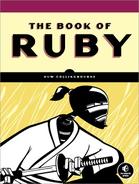The =˜ operator is not the only means of finding a match. The Regexp class also has a match method. This works in similar way to =˜, but when a match is made, it returns a MatchData object rather than an integer. A MatchData object contains the result of a pattern match. At first sight, this may appear to be a string.
match.rb
puts( /cde/ =˜ 'abcdefg' ) #=> 2
puts( /cde/.match('abcdefg') ) #=> cdeIn fact, it is an instance of the MatchData class that contains a string:
p( /cde/.match('abcdefg') ) #=> #<MatchData: "cde" >A MatchData object may contain groups, or captures, and these can be returned in an array using either the to_a or captures method, like this:
matchdata.rb
x = /(^.*)(#)(.*)/.match( 'def myMethod # This is a very nice method' )
x.captures.each{ |item| puts( item ) }The previous displays the following:
def myMethod # This is a very nice method
Note that there is a subtle difference between the captures and to_a methods. The first returns only the captures:
x.captures #=>["def myMethod ","#"," This is a very nice method"]
The second returns the original string (at index 0) followed by the captures:
x.to_a #=>["def myMethod # This is a very nice method","def myMethod ","#"," This is a very nice method"]
